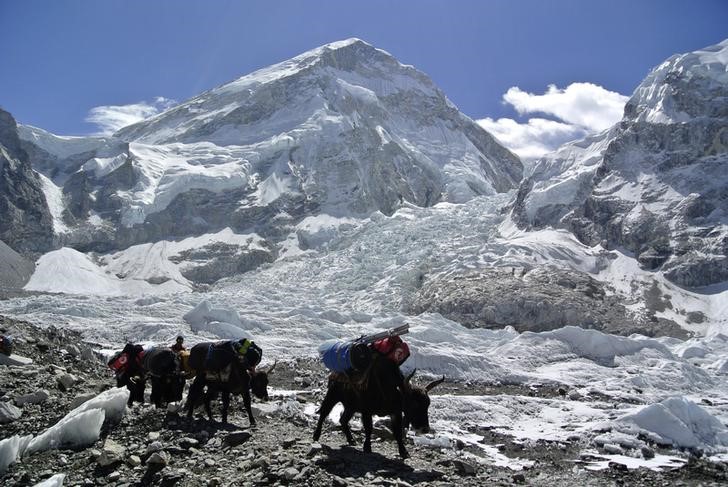By Gopal Sharma
KATHMANDU (Reuters) - Nepal sees no need to approach the International Monetary Fund (IMF) for a fresh loan as pressure on foreign exchange reserves is easing after a pick up in tourism, its central bank governor said on Monday.
"At present, our focus is on managing demand to reduce pressure on foreign (exchange) reserves," Maha Prasad Adhikari, governor of the Nepal Rastra Bank (NRB) told Reuters in an interview, noting that rising workers' remittances and tourist arrivals offered a "silver lining" for the economy.
Tourism earnings increased more than three times to 25.52 billion Nepali rupees ($201.8 million) in the 11 months to end mid-June, compared with the same period a year earlier, though they are still well below pre-pandemic levels.
Remittances from overseas workers, meanwhile, rose 1.5% to $7.5 billion during the same period, government data showed.
"It is expected that these developments will help ease external sector pressure in a few months," Adhikari said, when asked about the possibility of seeking an additional loan from the Fund.
His comments came after Finance Minister Janardan Sharma was reinstated on Sunday, after a parliamentary probe found no evidence to prove that he was involved in making illegal changes to the budget.
Many economies in South Asia including Sri Lanka, Pakistan and Bangladesh have sought IMF assistance to reduce risks of defaults on external payments following a jump in the prices of imported fuel and grain, while export earnings have been much more muted.
Earlier this year, the IMF approved $396 million of assistance to Nepal, a 38-month financial assistance arrangement under its Extended Credit Facility, to mitigate the pandemic's impact on its economy.
Before that, IMF approved financial assistance of $212 million for Nepal in 2020 after a sharp drop in foreign exchange earnings from tourism and remittances.
Nepal’s external debt has more than doubled to $7.77 billion in 2022 from $3.8 billion in 2012, according to government estimates.
Its forex reserves have declined to near $9 billion, barely sufficient to cover imports for about 6 months, from near $12 billion a year earlier - leading to worries among some international experts that Kathmandu may need foreign assistance.
Adhikari expressed confidence that recent tightening of monetary policy would prevent imports from increasing further.
Nepal’s imports grew more than 24% percent to $15 billion in a year ending mid-July, from $12 billion in the previous year, while exports surged 41% to $1.56 billion from $1.1 billion, latest data from the Department of Custom showed.
Adhikari said there was no plan to place more restrictions on imports, referring to a recent extension of curbs on luxury goods and non-essential items till the end of August.
"Rather than putting direct curbs on imports, our focus will be on stabilizing the external sector by managing demand through tightening measures."
He expressed the hope that inflation would soon ease.
"If the petroleum prices normalize and the global supply chains affected by the Russia-Ukraine war resume fully, we are hopeful to achieve the inflation goal of 7%."
Nepal's retail inflation accelerated to 8.56% for the month ending mid-June, the highest in nearly six years, prompting the central bank to raise policy rates last month.
($1 = 126.4900 Nepali rupees)
